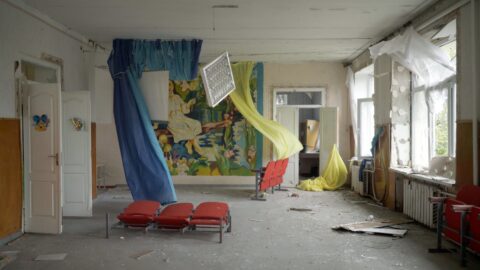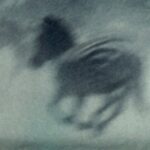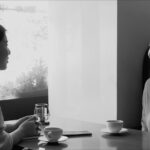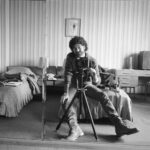A grim watch, but a necessary one. Intercepted (Oksana Karpovych, 2024) is simple in its form — contrasting images of an eerily quiet war-torn Ukraine with phone calls back home between Russian soldiers and their loved ones. But it reaches towards a complex web of contrasting emotions: rage, fear, nihilism and despair.
Karpovych moves between still images of bombed-out interiors, messy apartment buildings with blown-out windows, and tracking shots of the Ukrainian landscape; rows of houses, fences and clothes left behind. Shot in parts of the country still reeling from Russian occupation, these carefully chosen visuals are contrasted with calls intercepted by the Ukrainian secret services between March and November 2022. Whether they are phoning their mothers or their wives, the Russian soldiers lay bare the brutal cost of the war; in Ukraine, themselves and their families back home.
Its polyphonic construction reminded me of Svetlana Alexievich’s non-fiction work, with the overlapping voices creating a bitter mosaic of the Russian imperial machine. This is a deeply miserable portrait of a nation driven to senseless acts of genocide by Vladimir Putin and his cronies.
Thankfully, the film avoids simplistic condemnation of all Russians by the sheer diversity of voices on offer, from the tired and miserable to the nihilistic and insane, men and women driven to genocidal acts by sheer blind hatred. And while some soldiers are well aware that there is no meaning in their mission, others gleefully revel in mass murder, looting and torture.
Perhaps even more disturbing are the responses of their mothers and wives, calling Ukrainians Nazis, khokhols, banderites and even non-people; cheering their boys on to further depravity. In the most shocking exchange, one mother tells her son to cook Ukrainians like shashlik. It’s shocking, albeit unsurprising, just how poisonous Russian state propaganda can be.
(I imagine that calls intercepted from 21st September 2022 onwards, when the government called massed mobilisation, might have taken on a different tone.)
At times these calls are so compelling, they overwhelm the images, especially as there is little direct correlation between what we hear and what we are shown. Additionally, despite a reference to going to the mosque, we get little sense of the diversity of the Russian army, where ethnic minorities, such as Kazakhs, Yakuts, Mongols, Buryats and Kalmyks, are often the first sent to the frontline and the most likely to die. For the average watcher, these men will all scan as white.
Nonetheless, this is a powerful evocation of the horrors of war. The stark absences stir the darkest recesses of the human imagination.

Redmond is the editor-in-chief of Journey Into Cinema.




